Corporal Norman Boyden’s Gallipoli Diary
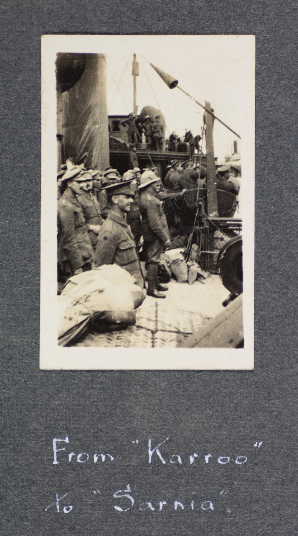
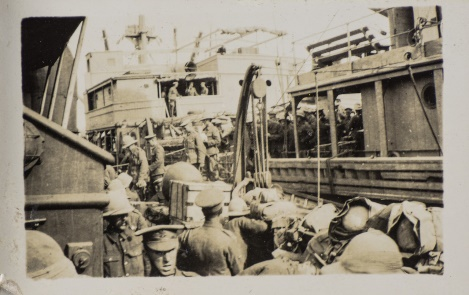
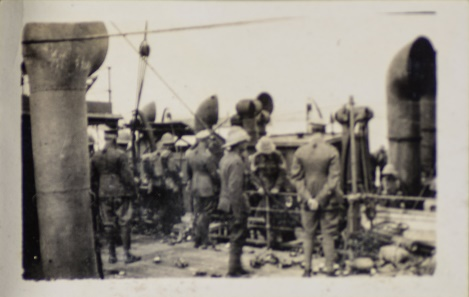
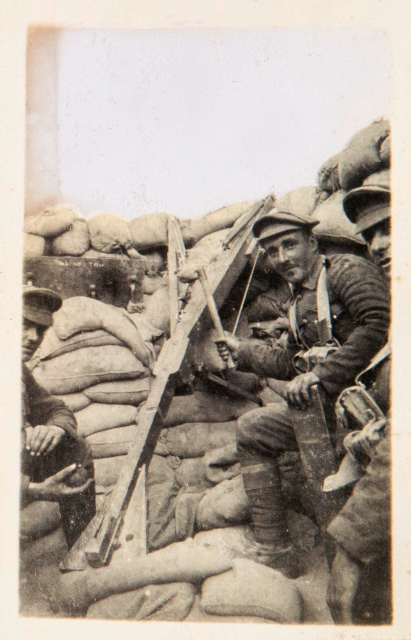
Transcribed and compiled by Rosemary Boyden and presented by Lisa Forward
During the First World War my late father-in-law Norman Boyden kept a Diary from 16 November 1914 to 18 October 1916 in which he recorded the day to day events of his service in the British Army during that period.
The Diary is a small but well used notebook. As the entries were often made in extremely adverse conditions they are sometimes difficult to read. Matching the diary entries to people and events took a little detective work and quite a bit of research on my part. I hope the reader will derive as much interest from this transcription as I did from the original.
Churchill on 31 August 1914 discussed an idea of an attack against Turkey as a diversion. It was rejected because it was geographically a nightmare.
At that time the country which is known today as Turkey was the Anatolian region of the much larger Ottoman Empire which reached from Constantinople to Basra and from the borders of Egypt to those of Russia and Iran. British and German influence over the Turkish Armed Forces was closely balanced. Then the British Government refused to recognise the Turkish ownership of two battleships undergoing repairs in England. This seems to have been a political act to force Turkey to go to war which it did two months later on the 31st October 1914. By the end of November 1914 the newly constituted British War Council discussed the best way to protect the Suez Canal and the British presence in Egypt from a Turkish attack across Sinai, and consequently the impossibly difficult peninsula consciously became a bloody reality.
Norman from December 1914 was stationed in Malta; training hard, practising trench digging and enduring strenuous overnight marches (of 23 miles!) in full uniform, as part of the combined Mediterranean Expeditionary Force. This force included ANZAC, Maori, Indian, British and French troops.
In Malta in late January 1915, Norman managed to take interesting photos of the Emden prisoners at Vadala, whom they had been sent to guard. [Note-After the battle with HMAS Sydney on 9th November 1914 in the Indian Ocean, some of the survivors from the SMS Emden and the SS Buresk were transferred to three vessels in the first ANZAC convoy to Egypt and Malta, and some to Mittagong, NSW.]
From the 5th May, after the Anzac invasion at Gallipoli, wounded troops were sent to Malta to the point that there was no room for many of the British troops. So the 2/4 Battalion sailed to Egypt for four months of training. After this they sailed to Mudros in Greece for one night before being transferred to the Gallipoli Front. Here we begin Norman’s diary.
14 October 1915 – Iron rations drawn. Orders state Battn. will probably leave boat tomorrow – concert.
On 15th October the Battalion disembarked off Cape Helles. They marched in single file along a pier made of sunken ships to “W” Beach: here the first sound of firing and explosions reached their ears.
20 October – Marched off 8am to Eski lines carrying field pack, 22rds, respirator, smoke helmet, sulphur-bag, rifle, blanket, ground-sheet & spade. Under shrapnel most of the way up especially at gap where we had to come up to ground level. Captain Morris and 3 men wounded. Flies abound in thousands. Cook our own food. Fetched water (about 20 minutes each way).
23 October – Stopped raining but awful mud everywhere still-digging at 7.30 – no proper breakfast but plenty of rice, currants & tea at dinner time. Syd and self on guard at end of line next to Lancs Fusiliers – very cold job. Alarm at about 9pm – Turks massing in gully – guards all along the line all night – “stand at arms” at 5.30am.
Friday 29 October – Washing clothes etc mrng. Digging Party on Mile trench from 1.30 to 5.30. Rice & Geoff’s guava jelly for tea. Dark by 6 so turned in early as usual & talked of home. Had the pip rather as there seems no sign of the end in sight. Only chance of getting home seems to be getting wounded.
1 November – Digging on dug-outs 8-12 – head still bad – Bearman on sick list – cigarettes and tobacco served out – Good mail in – turned in early & read by candle light.
2 November – Went sick – diarrhoea & headache – more letters – Reported at 6 p.m. fit to go to trenches but had very bad night so saw Doctor first thing on.
3 November – was left behind – Barman and O’Hanlon also stopped behind – went to Hospital 9 pm & was put on Arrowroot and Bovril diet – felt better by teatime – Bearman no better – Syd in our dugout.
6 November – Hospital 9 a.m. Same diet & tonic – had general cleanup in morning – cloudless weather continues – made biscuit porridge & café in evening. Thomas gave us tin of syrup!
7 November – Same diet and tonic – Beach canteen for chocolate & milk only – letter writing all afternoon – Biscuit porridge a great success – made lamp out of tobacco tin & paraffin from QM.
8 November – Tonic and full diet – Canteen (RND) for Cigarettes & Milk – Found out Bearman gone to Mudros – Tobacco ration – had bath in trench – letter writing – cleaned Dixies for cookhouse in afternoon – Nestlés biscuit porridge – New Punch to read in evening – Div up Bearman’s things.
27 November – On fatigue at BHQ 7 a.m. – latrines, chopping wood etc. until about 10 a.m. – came back & spent some hours on clearing out dug-out – put roof on differently – drew winter clothing in afternoon – came on to rain just as dug-out finished – spent evening in dark as we had no candle – said to be no paraffin or candles on peninsula, rations also being shortened, rumours of blockade or else rough weather prevents rations being landed.
The Battalion History for that day notes that it was the 43rd day it had spent on the Peninsula. It goes on to say that in the afternoon the wind shifted suddenly to the north and a bitter, biting, piercing frost set in. Drenched great coats grew so stiff that they would stand up by themselves; the water froze round the men’s feet as they lay snatching the wretched sleep of utter exhaustion. Some of them were only kept alive by being made to work hard all day with pick and shovel.
The next day the Battalion History reports that the ground was covered with snow that morning and the fierce north wind was so strong that you could not stand against it; it lashed the face and inflamed the eyes. This weather continued all day but working parties from the Battalion carried out their work on the new winter quarters with the best of spirits. The thermometer kept well below freezing point.
28 November – Woke up to find snow on ground – went sick with rheumatism as can’t sleep at nights with pains in limbs – terribly cold day, snowing until midday – Tiny (Grenadier) & self spent morning in dugout – Bully for dinner again no fresh meat obtainable, however had tinned tomatoes & apples so not bad – turned in during afternoon to try & get warm – had run round about 5.30 before turning in for night – bacon fat lamp lasted hour or so.
29 November – Dry and freezing hard all day long – bitter wind – dugouts 8-12 – an agony to hold pick and shovel until we got a bit warm – bully and rice for dinner – rifle inspection in afternoon – wrote home and smashed biscuits bought chocolate at Q.M. – had porridge in evening and fire in dugout – no light so couldn’t read.
[Note – By then only Helles remained, where a curiously suspended state of warfare existed. The men of both sides were not inclined to be aggressive – the Turks because they thought the British would soon leave and the British because it did not make sense to die for a lost cause.]
20 December – Went to Bgde 8.30 – met Bob who said Syd had been slightly wounded – saw him later on way down, walking – heard that Suvla and Anzac had been successfully evacuated – looks as if we shall get rough time. – Bgde 6.30 – met some Frenchies & managed to talk to them a little – went up to Firing Line with Turgel, back about 2330.
On Christmas Day the ‘Friends of the 2/4 Battalion’ in England sent every man in the Battalion a Christmas card with the lines:
God bless your arms,
God speed your victory,
God grant your safe return.
The evacuation of Helles began on 1 January 1916 but at first, few of the men were aware that it was underway. By 7 January nearly half the men had gone. The last 17,000 were to be taken off in a single night.
1 January 1916 – Up at 3.30 to guide party to MG – back at 5 a.m. – C.O. stated he hoped we should be on “high seas” tonight – news that we were leaving Eski at 1700 – reported to Captain Arthur & followed at rear of Battn.– only A. Coy and details left (Syd with them) – slept with 5 Platoon.
2 January – Got kit-bag & changed & packed up – told we shall probably lose kit-bags – shells falling very near – went to Orderly Room about 10 am, had very little to do – hoped to go in evng. but no news – beach shelled all night.
3 January – Shells falling very near – smothered in dirt – suspense horrible now we know it is evacuation & not relief – guns being replaced by trees – adjutant says plans may have changed & we may be stopping to end – Bgde in evng with Turgel – Gen. Mercer said “last night but one” – barbed wire all across Peninsula.
6 January – Glorious fine mrng – Camp Commandant at 8.30 – Our aeroplanes busy – shelling fairly quiet – French soup for dinner – went in evng with CO to find way to “V” Beach – on return just starting macaroni when rumours come of some leaving – orders to go with Captain Arthur & draft from A, B and C Coys – left Caesar Camp 10.15 marched to “V” Beach in parties of 30 – went through “River Clyde” the “water boat” – about ¼ hour out collided with French boat which had to beach – got on SS “Esmanich” (Khedival Line) about 12.45 – found comfortable kip with Prior.
[Note-Captain Keen and 5 other junior officers with 147 other ranks (including Norman) left the Battalion and embarked for Cape Helles. Four of these then volunteered to remain on the Peninsula to assist with connecting up mines for the evacuation of Cape Helles on the 7th January.
7 January – Woke up to find boat in Mudros – sun shining – Biscuits, cheese & milk for breakfast – landed about noon – had wretched long march – saw Syd & Fred drilling & later on Will – wangled all in same tent relating various experiences – glorious feeling of security – wretched cold which started two days ago still hanging about.
The 8 1/2 month campaign was over two days later. The British Empire and its French allies suffered over 250,000 casualties. Britain had lost 21,255 men which was the highest of all the Allied forces but still only a quarter of the Turkish losses. Norman’s Battalion returned to Egypt in January 1916.
“I feel very deeply sorry for your departure, and it seems to me that my sorrow will last forever. Your noble feelings to me that were clearly expressed in your letter and your kind words left a pleasant effect in my heart, which will never be forgotten. You thanked me for welcome and hospitality but what welcome did I extend to you? I have done nothing that can be mentioned beside the debt we owe the English. If we are happy or at comfort, if we enjoy peace and prosperity, if we are rich and can do any hospitality to our guests, it is to your kindness, true efforts and to the improvement you have done in Egypt since occupation that we owe all this. As for you personally and your Regiment, it is very difficult for me to see you off but I trust that you will leave Egypt only, but not our hearts. We shall always remember your kind treatment. Kind regards to you and best wishes to Great Britain and her Allies” (Commandant from Said Melika of Beni Mazar Egypt, 10th April 1916)
At 8.15 a.m. the next day, the Battalion paraded in full marching order. At the station over 100 chiefs and notables had come to say goodbye. Norman’s Commanding Officer Col Vickers Dunfee then replied to the above embrace of camaraderie from the Commandant, his Egyptian equal.
“… We shall retain in our hearts many pleasant memories, and we trust that this happy friendship may be the means of drawing our country and yours nearer to one another.”
These are not light words. Yet, exactly 100 years later Britain and her Allies have destroyed the Beni Mazar Commandant’s kind, musical and gentle wishes. Egyptians still have not withdrawn the extended hand of friendship they offered 100 years ago.
The Battalion went to France where Norman was injured. Although he must have felt frustrated at being left behind for so long at Rouen, he probably later reflected that he was very lucky that he did not join his friends at the Somme. In that battle which lasted from 24 June to 18 November 1915, the British in one day suffered 57,400 casualties including 20,000 killed.
There is one other aspect of the diary which is interesting and that is the presence of lists. Apart from the usual lists of addresses of friends and relatives Norman kept records of his expenditure. He also took lots of photos and it appears that many of his mates asked for copies. These requests are listed in his little black book too.
There is a sad footnote to this story in that a number of Norman’s comrades-in-arms did not survive the rest of the war. The following information is taken from the Battalion History:
Bearman, W. (Will) transferred to 1/4 Battalion, London Regiment and was killed in action at the battle of the Somme on 11 July 1916.
Burford, D. was attached to 1/13 London Regiment and mortally wounded on 1 July 1916.
Foster, H. transferred to 1/4 Battalion, London Regiment from Rouen 30 July 1916. He was wounded in the left arm and discharged on 12 April 1917.
Lester, G.E. (Geoff) transferred to 1/4 Battalion London Regiment from Rouen. He was granted a commission and joined the new 2/4 Battalion, London Regiment. He was wounded 3 times and taken prisoner on 21 March 1918 when wounded.
O’Hanlon, S. (Sid) transferred to 1/4 Battalion, London Regiment on 6 May 1916. He was killed in action on 1 July 1916 (probably at the Somme).
Pearce, F.W. transferred to 1/4 Battalion, London Regiment. He was discharged in May 1918 after amputation of toes.
Shinkfield, E.S. transferred to 1/4 Battalion, London Regiment. He was killed in action on 28 May 1916 at Hebuterne.
Shinkfield, H.J. transferred to 1/4 Battalion, London Regiment. He was killed in action on 1 July 1916 at Hebuterne.
Trayner, A. transferred to 1/4 Battalion, London Regiment. He was wounded and suffered shell shock. He was discharged on 27 February 1917.
Trayner, H. transferred to 1/4 Battalion, London Regiment. He suffered gunshot wounds and was in hospital for 5 months.
This diary of my mother’s father-in-law is about peace, not politics. The war wasn’t as they had all hoped it to be: “The war to end all wars.” It was the war that had left all Norman’s war friends disabled, shell shocked, gassed or killed as noted by my mother and emphasised by my stepfather, when he commented on this summary of his father’s experiences. This list had been friends with whom Norman had “wangled in the same tent relating various experiences”, feeling a “glorious feeling of security” under a “shining sun” in Mudros, Greece, after Gallipoli. He had really hoped for peace after their abysmal treatment.
Perhaps future British and Australian soldiers will one day remember Egypt’s peoples, the Commandant and Norman. The local Egyptians, it would appear, also wanted the same kind of peace that Norman had gloriously felt in Greece, after Gallipoli. Norman wrote, after the London Battalion abandoned Gallipoli, and was sent to Egypt to train:
29 January 1916 – Cairo with Syd, Tiny & Jim – saw bazaars & Mosque of Am & did shopping.
22 February – Visited villages, got hair cut & watch glass – Gifts from the natives of Oranges, Tangerines, Sugar canes, molasses “honey” & cigarettes.
These men and women gave their allies all that they had to give. And friendship!
For the Egyptians, memories have value. They are the custodians of early civilization and the memories of the British and their Allies in 1916. We may be at one with them in attempting to eliminate Islamic terrorism, but for some of our latter-day knights it is for their own financial benefit. Britain and her Allies need to remember Egypt as a place of people rather than a zone for the mass destruction of culture.
Gallipoli was a forerunner to the following century of disasters in the Middle East. It was intended to provide a stronghold for a rear attack on Germany – a second front where they could fight the suspicious Turk. The Gallipoli campaign consequently helped accelerate the breakup of the Ottoman Empire.
The British will now, 100 years after Gallipoli and the Middle Eastern Campaigns, help ruin the lives of the descendants of these peoples with whom officers, officials and soldiers had exchanged promises of peace, by directly supporting the Saudis and selling them internationally illegal armaments. Politically Britain could study Arabic history.
Corporal Norman Boyden was spared in France, when his friends weren’t. Disillusion later set in and Norman overtly hated war. All his friends, whom he had carefully photographed, had been left maimed or dead. Norman wasn’t unique – this loathing of war was the culture in the 1930s and 1940s when Stephen, my mother’s husband, grew up. Norman later told his children to never go to war, and they didn’t.
After the war Staff Sergeant Norman Boyden became a bank manager. During WWII he did something he’d been taught to do well – he dug a bomb shelter – an escape ‘trench’ – in his London back yard. Also, as a warden, with his only son Stephen, he helped get people to safety in the underground during air raids.
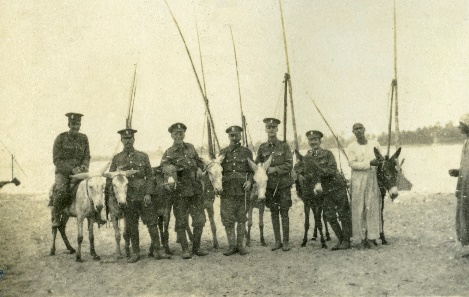
On the banks of the Nile

A few years ago my mother, Rosemary, transcribed her father-in-law’s diary. She then put it into the context of the 2/4 (London City) Battalion’s official diary, adding further historic comments. This is an abridged version of both the diary (bold) and my mother’s work (in printing). I have added summaries, notes and comments (in italics) from reading, listening and research. Some place names may have alternative spellings, but these have not been changed from those used in Corporal Boyden’s diary.